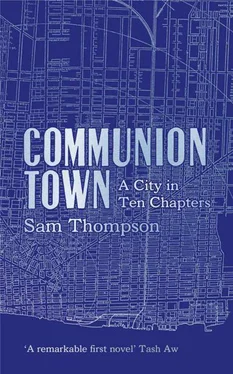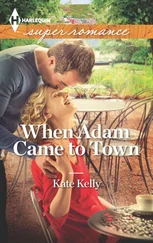The streets were almost dark, the daylight retreating into the clouds where it would soon fade, and the evening was colder than he had thought. He pushed his fists into the pockets of his jacket but the wind went through the cotton and the pavement’s chill had infiltrated the soles of his shoes. The migraine was a clenched fist behind his eye. As he stepped off the pavement on the Part High Street the front corner of a single-decker bus snapped at his sleeve and the driver leant on the horn, loosing a long peal of abuse. He looked up and down the road before trying again. Shopkeepers were hauling down loud steel blinds and some of the streetlamps had come on, their glow darkening the air.
On Dapper Street some youths were killing time by the ash-bins, bullying a dog that kept nosing around their ankles. Once he had slightly known a man who died when a group of boys and girls had knocked him down and jumped on his head. Having an aspiration was like carrying a wad of cash in your pocket: they knew by instinct there was something they could take off you. On these afternoons the city was nothing but cold brick and closed faces, and it made him feel that he was no different from the fat bookseller, a shabby clown wandering the streets in search of some delusion. But that was not true. His aspiration was not like that.
It was the earliest desire he could remember. He had always known that there were clues in the city, traces of what he was looking for, certain streets which he was sure would lead him where he needed to go. In childhood he had discovered that anything could be a signal: guano on red brick and white pavement, blackberries under a concrete walkway, water swirling into the mouth of a storm-drain. Gradually he had come to understand that hidden in some fold of every scene was the Flâneur, always moving on around the next corner, and sometimes he felt on the brink of understanding why he wanted so much to follow; sometimes he felt sure that the real mysteries do not conceal themselves but live beside us in plain view. Once he had seen the corpse of a blackbird splayed on the pavement with its body scooped away, leaving the head, wings and feathered ribcage, a shaman’s cloak. Another time it had been a one-eyed yellow tomcat whose punctured orb had shrivelled in the socket like dried egg in the bottom of a pan. These encounters were promises of a kind.
Two seasons ago he had come close, closer than before or since. It had happened at the end of an afternoon like this one when, heading back to Florence’s house, he had lost his bearings. He had kept on walking as the dusk gathered, sure that he must soon recognise a street or a building, but it was as if he had chanced into another city where he saw only dead ends and locked metro stations. He had walked faster, his watering eyes smearing the streets with light. When he saw the figure, it was far off, standing at the other end of an echoing pedestrian tunnel whose walls angled inwards to give a false perspective. For an instant he thought it was another citizen out walking late, but it turned its pale head towards him while beside him a film of dirty water coursed over tiles like teeth, and in that moment his feet tangled so that he tripped and spun and slammed into the wall. He picked himself up and walked away, not quite daring to run, never once looking over his shoulder, half-expecting to hear a lame footfall close behind.
He had never found out where he had been that night, but since then he had been keeping to familiar parts of the city.
Now he crossed the Part Bridge and continued towards the Old Quarter until the Impasto Street metro came in sight. On days like this, days when he decided to leave Florence and begin his search for the Flâneur, it was here, more often than not, that he would change his mind and catch a tram back to Lizavet Heath. When he saw the yellow mouth of the metro station glowing among the smaller lights, he would discover that he was not yet ready for the pilgrimage, and, knowing that readiness was all, warmed by a certain wryness at his own expense, he would pass through the turnstile and buy a ticket home.
As he went down to the platform he thought of Florence. On dull days she often lit the fire to comfort herself and so that the cats could stretch out on the hearthrug. She might still be sitting on the sofa, not turning on the lamps as the room darkened, or she might be trying to read a book or cook a meal: but no matter what she did she would in truth only be waiting, purposeless as a ghost in her empty house, for him to come home. A couple of hours ago this thought would have exasperated him, but now it seemed not so bad. It wasn’t her fault that every time he came back she would greet him with simple relief, unable to disguise how glad she was to have him with her again. He didn’t blame her for that: it was sweet in its way.
This evening the tramcar was empty except for an elderly man seated at the front, gazing into the glass. Simon sat close to the back and as the car began to move he realised that by blessed increments the throbbing in his head was letting go. The poisoned core of the migraine had drained out. It always happened at this point in the journey, he now remembered: it was strange how each time he forgot. The tram jogged, the old man swayed like a doll loose at the neck and Simon’s body copied the movement. He felt good. When he got back to Ectarine Walk he would make it up handsomely to Florence. He would tell her how much she meant to him and do whatever was needed to make her happy, not out of guilt but because he felt now that it was true.
By the time he climbed up to the street at Lizavet Heath he could barely recall the ache in his head. The last of the daylight had trickled behind the rooftops, but a bright sensation spread in him as he walked, beginning as a spark in his chest and soon spilling through his body, translating him into a lighter substance. In a way he did all of this for her sake. He was impatient for the surrender that he would see in her face a few minutes from now.
The front windows were lit along Ectarine Walk, but Florence’s house was dark. The curtains were open in the bedroom window above and he could see part of the room’s ceiling in the glow of a reading lamp. Otherwise the house might have been untenanted. He mounted the steps to the front door and found a bulky object propped against the jamb. It was his old rucksack. His key would not go into the lock: Florence must have left hers on the other side. He rattled the key back and forth, trying to dislodge the obstruction, then rang the doorbell and waited, then rang again. He opened the rucksack, which was packed with his T-shirts and jeans, neatly rolled. He stepped back into the street and peered up at the window. As he watched, the light in the bedroom went out.
He stood for a long time in the street waiting for some further sign, and then no longer waiting but simply standing there below the dark house. He stood until he had established it fully, because if this was what she wanted then he was going to insist on it: there would be no mistake.
He could no longer see the house, having stared so long that it was only a group of dim flat shapes which hovered featureless behind the streetlamps. He had nowhere to go and night had fallen, but he climbed the steps, picked up his rucksack and, to justify himself the more completely, dropped his keys through the letterbox, becoming aware as he did so of the city’s empty spaces lying open around him in every direction. From somewhere came the echo of an uneven footstep and for an instant he glimpsed water flowing across yellow-white tiles, but the street was deserted. The lamps tilted slow pinwheels of light. He paused and looked back before he turned the corner, but no one prevented him from leaving.
Florence woke earlier than usual. She lay for a few minutes listening to far-off traffic sounds and thinking her way into the morning and beyond it. Dismay stirred at the thought of how much would be required of her in the time ahead, but she told herself to keep her pace steady and spend her energy well. She could not be sure how much she had in reserve, but she was better than before, rested and prepared, and besides there was no delaying any longer. It had been six months of guilt and consternation.
Читать дальше
Конец ознакомительного отрывка
Купить книгу












